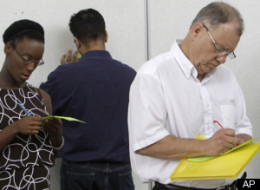
Legislation by Sen. Debbie Stabenow (D-Mich.) to help the "99ers" -- unemployed people who've exhausted the 99 weeks of unemployment insurance available in some states -- failed in the Senate on Wednesday, to nobody's surprise.
Sen. George LeMieux (R-Fla.) objected to Stabenow's unanimous consent request. "Without knowing how much it is going to cost and how we're going to pay for it, while we're all certainly sympathetic and want to work to make people go back to work -- my home state of Florida certainly suffering with very high unemployment -- we need to know how we're going to pay for it so we don't put this debt on our children and grandchildren," said LeMieux.
Stabenow's bill would have provided an additional 20 weeks of benefits in state where the unemployment rate is above 7.5 percent, and it would have boosted a tax credit for businesses that hire unemployed workers. Stabenow said she wanted the bill to be designated "emergency spending" and exempt from "pay-as-you-go" rules, as is customarily the case with unemployment benefits.
"The reality for us in America is that we will never get out of debt with more than 15 million people out of work," said Stabenow. "So when folks talk about the deficit and leaving the deficit for our children, we will never get out of debt had this country until people get back to work, until they have good-paying jobs, and in between times, we will not move this economy forward until we are helping people be able to keep going in this recession."
Despite the lobbying of the unemployed, additional weeks of benefits seemed like a hopeless cause after the Senate spent 50 days this summer in gridlock over a reauthorization of the existing 99 weeks.
Several unemployed people have told HuffPost over the past few weeks, however, that they appreciated the gesture even if the bill had no chance of success. Stabenow's spokesman ignored repeated requests for info from HuffPost.
To fight recessions Congress has routinely enacted extensions of unemployment benefits, but the 99 weeks currently available in some states is an unprecedented amount. The previous high was 55 weeks during the recession of the early 1980s. The current extensions will be up for reauthorization again in November.
"It seems to be business as usual in the Senate, with yet another attempt to help the long term unemployed blocked by someone who just doesn't understand how truly awful it is for job seekers," said Judy Conti, a lobbyist for the National Employment Law Project. "It's a sad day."
http://www.huffingtonpost.com/2010/09/29/tier-5-legislation-for-99_n_744215.html
Sen. George LeMieux (R-Fla.) objected to Stabenow's unanimous consent request. "Without knowing how much it is going to cost and how we're going to pay for it, while we're all certainly sympathetic and want to work to make people go back to work -- my home state of Florida certainly suffering with very high unemployment -- we need to know how we're going to pay for it so we don't put this debt on our children and grandchildren," said LeMieux.
Stabenow's bill would have provided an additional 20 weeks of benefits in state where the unemployment rate is above 7.5 percent, and it would have boosted a tax credit for businesses that hire unemployed workers. Stabenow said she wanted the bill to be designated "emergency spending" and exempt from "pay-as-you-go" rules, as is customarily the case with unemployment benefits.
"The reality for us in America is that we will never get out of debt with more than 15 million people out of work," said Stabenow. "So when folks talk about the deficit and leaving the deficit for our children, we will never get out of debt had this country until people get back to work, until they have good-paying jobs, and in between times, we will not move this economy forward until we are helping people be able to keep going in this recession."
Despite the lobbying of the unemployed, additional weeks of benefits seemed like a hopeless cause after the Senate spent 50 days this summer in gridlock over a reauthorization of the existing 99 weeks.
Several unemployed people have told HuffPost over the past few weeks, however, that they appreciated the gesture even if the bill had no chance of success. Stabenow's spokesman ignored repeated requests for info from HuffPost.
To fight recessions Congress has routinely enacted extensions of unemployment benefits, but the 99 weeks currently available in some states is an unprecedented amount. The previous high was 55 weeks during the recession of the early 1980s. The current extensions will be up for reauthorization again in November.
"It seems to be business as usual in the Senate, with yet another attempt to help the long term unemployed blocked by someone who just doesn't understand how truly awful it is for job seekers," said Judy Conti, a lobbyist for the National Employment Law Project. "It's a sad day."
http://www.huffingtonpost.com/2010/09/29/tier-5-legislation-for-99_n_744215.html








First Posted: 09-29-10 04:55 PM | Updated: 09-29-10 04:59 PM